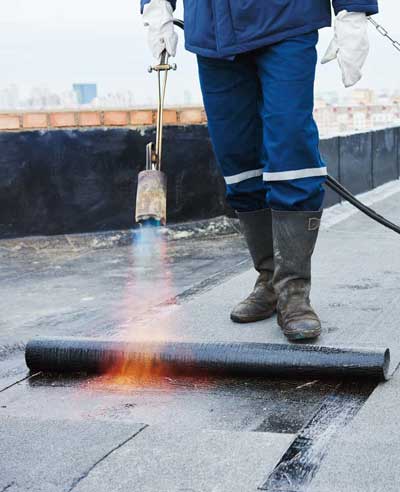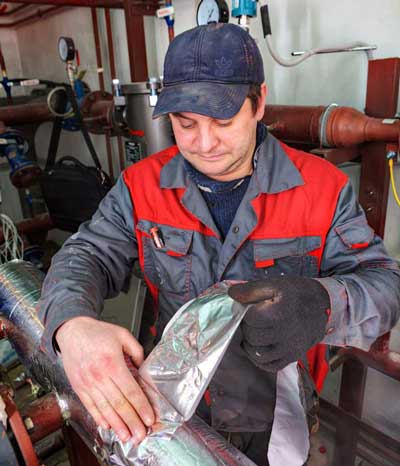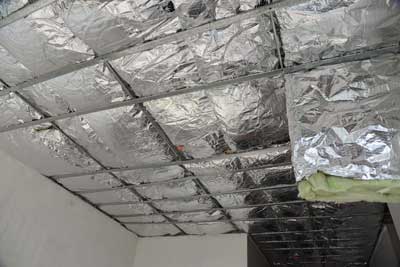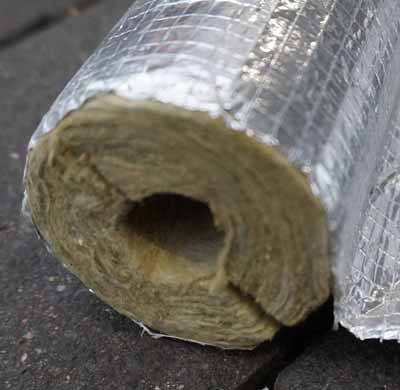
Aluminum foil is used as a vapor barrier for building insulation. In combination with bitumen, it is used for flat roofs. This combination offers the typical advantages of multilayer composites, in which the properties of the individual components complement each other.

Laying of bitumen membranes on a flat roof
Advantages of aluminum foil with bitumen for building insulation
If compared to other conventional vapor barriers, aluminum foil has some properties which generally (and also in some cases) have an advantageous effect in combination with the bitumen sealant.
For purposes of insulation aluminum foil is characterized by the following properties:
- heat resistant
- raincoat
- non-flammable
- light
- aging resistant
- UV-stable
Through self-passivation, aluminum foil also offers corrosion protection . However, in the case of external applications with contact with rain or in the nearby area of seas with salt water, aluminum foil should be varnished or protected in a different way.
Aluminum with bitumen for flat roof insulation
Although aluminum counts as a tough metal, an aluminum foil can for sure be pierced or torn by pointed and sharp-edged objects. This is due to its low material thickness, which can be in the range between a few micrometers and millimeters Especially when it is placed on a soft surface, like for example on an insulating material
In context of building insulation, such risks exist above all in the processing and in accessible roofs that are flat . This problem disappears, if the aluminum foil is combined with bitumen to a composite material in a similar way to aluminum composite plates.
The bitumen on flat roofs protects the aluminum foil from damage.

Pipe is insulated with Aluminum
In the case of building insulation, it is thus advantageous for the reliability of the seal if the aluminum foil serving as a vapor barrier is protected by a bitumen sealing strip as if the metal foil is merely connected to an insulation material, like for example mineral wool.
Bitumen sealing sheets with aluminum foil are suitable for all kinds of flat roofs , for cold roofs and as well for warm roofs (with and without load).
Aluminum foil with bitumen for industrial roof constructions
The building insulation of roofs in the field of industry must fulfill certain special requirements, especially with regard to fire protection.
Bitumen roof sheets with support of aluminum foil also meet these requirements. They meet the requirements of DIN 18 234 for fire protection for large-area roofs. Those are often found in the industry. In the case of fires in the interior of the building, such aluminum bitumen roof sheets do not have a fire-retardant effect.
Aluminum roof sheets are suitable for conventional roof constructions with insulation underneath of the vapor barrier, and as well for inverted roofs , where insulation materials lie above. Here in this type of construction, it is advantageous with industry roofs that the waterproofing with bitumen and aluminum foil is applied as a first layer during the construction of the roof structure. It can then serve as an emergency seal until the actual insulation material and the support have been applied and used up.
While sealing sheets with aluminum foil in form of welding strips require a full-surface support, there is special self-adhesive variants that are also suitable for application to trapezoidal sheets. Self-adhesive bitumen sheets with aluminum foil are also very suitable for sealing vertical building parts .
Aluminum foil for sound insulation
Strong noise is not only a major burden but also a health hazard. This is why in the construction sector and in the industry and many other areas a lot of attention is paid to noise protection. Aluminum foils provide better sound insulation and help to eliminate noise sources. They reliably improve fire and moisture protection at the same time.

Aluminum with scrim and mineral wool for ceiling insulation
Aluminumfolie for Schallisolation im Baubereich
Aluminum foil for sound insulation in construction
When choosing insulation materials in the building sector, their thermal insulation properties are usually the focus of all attention. Soundproofing most of the times only plays a subordinate role.
Especially in noisy and loud areas, it is worthwhile taking into account the acoustic specifics of the insulation materials from the very start. One of the best ways to combine thermal insulation and noise protection is aluminum foil.
Aluminum foil: Thermal insulation and noise protection in one.
Aluminum foil not only protects from excessive heat and cold, but also ensures an improved shielding against noise and vibrations .
A good thermal insulation with simultaneous sound insulation is best achieved by a combination of an insulation material and aluminum foil (as for example in the case of lamellar mats or alu-sheathed stone wool insulating sheets and mineral wool tube shells.

Aluminum with mineral wool insulates heat and sound
The foils ability to absorb sound allows unwanted noise to be picked up directly at the source and prevent its further propagation. Aluminum foil offers 85% effect as a noise insulator . That means, only 15% of the respective sound passes through it.
Companies that process insulation materials also appreciate the low eight and easy handling of aluminum foils. In addition, this material is convincing by its sustainability. Furthermore, its good recycling properties and its freedom from odors and pollutants add the convincingness.
Sound insulation in industry
In the industrial sector too, the use of aluminum foil has advantages for sound insulation, including interception of high frequency noise such as the hissing of steam engines. For example, vibration-damping adhesive tape is used here, which consists of a soft but adhesive polymer material and a thick aluminum foil.
Damping films coated with aluminum foil can reduce sheet vibrations and therefore be used to reduce noise emissions of light steel constructions. Sound-absorbing materials coated with aluminum foil are also used for sound absorption and insulation in machinery and engine rooms, construction machinery, vehicles, shipbuilding and mechanical engineering.
Sound-absorbing moldings based on aluminum foils are also recommended for the thermal and acoustic insulation of hot surfaces with temperatures of up to 500 degree C such as catalytic converters, exhaust systems and exhaust gas turbocharges.
Are you looking for aluminum or composite foils for the manufacture of your insulation materials?
